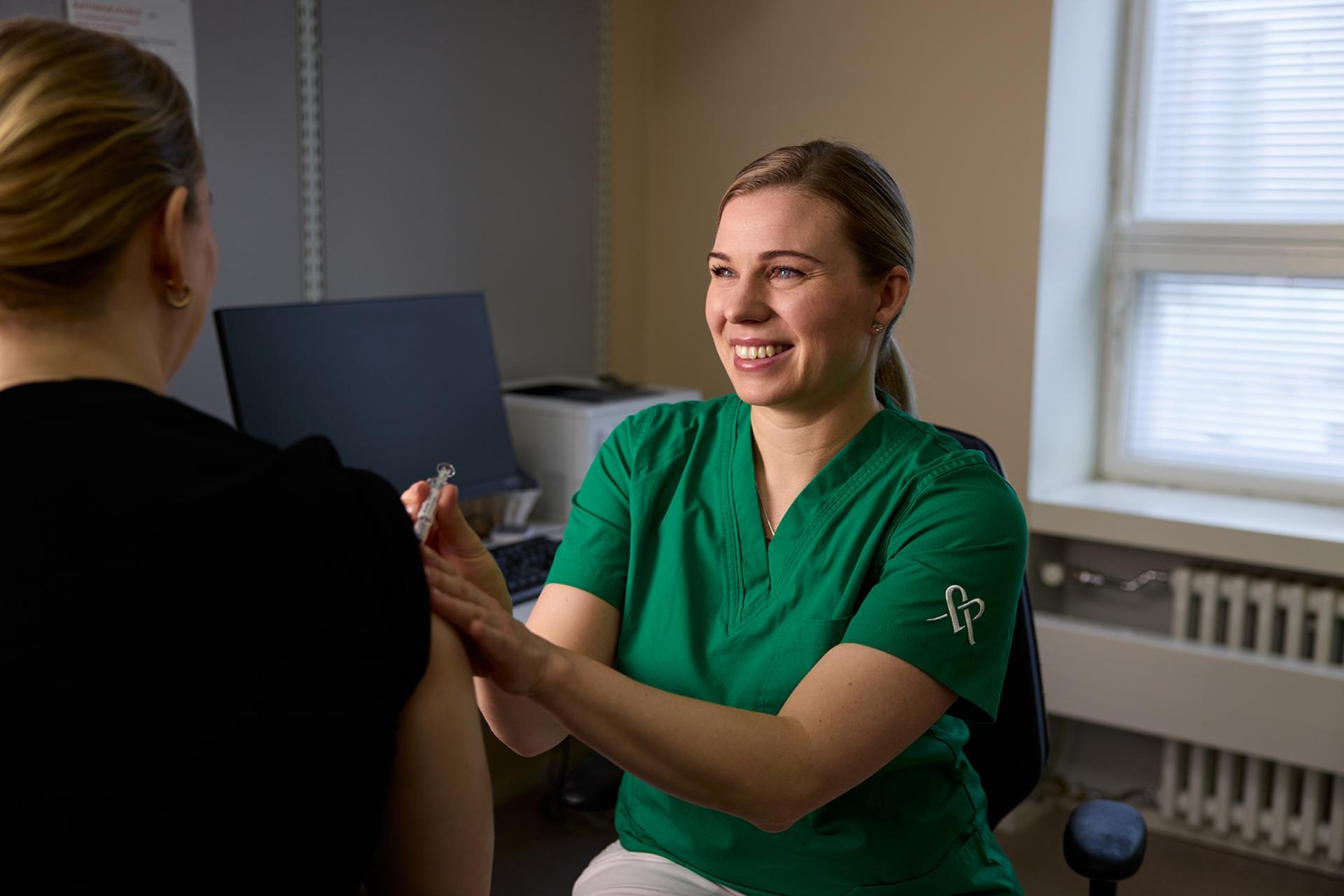
Influenza - Treat early on
Specialist in the article

Revised 9/16/2025
Influenza in a nutshell
- Influenza is an acute respiratory infection caused by influenza viruses A and B, affecting 5–15% of the population each winter.
- Risk groups for influenza include preschool-aged children, pregnant women, those over 65, and those with chronic illnesses and their close contacts.
- Influenza viruses constantly mutate, necessitating the annual renewal of the vaccine in the autumn before the epidemic begins.
Prevalence of influenza
The prevalence and extent of influenza vary annually. Each winter, an estimated 5–15 percent of the population contracts influenza. In Finland, the influenza season typically occurs between November and April.
Influenza A and B viruses differ in that type A usually causes more severe influenza epidemics, while epidemics caused by the B virus are typically milder. Influenza epidemics often begin spreading within specific population groups, such as military garrisons, from where they quickly spread across the country.
An influenza pandemic occurs when a new virus strain emerges, causing a broader and more severe epidemic than usual, affecting a significantly larger portion of the population.
Symptoms of influenza
Influenza is an acute upper respiratory tract infection caused by influenza viruses, and it differs from the common cold due to its more severe symptoms. Influenza typically begins suddenly with a high fever and severe muscle and headache pain. The symptoms are significantly more intense than those of a common cold.
The incubation period for influenza is typically 1–3 days. Only about half of those infected develop symptomatic illness. Even in healthy adults, influenza can lead to prolonged illness and complications.
Typical symptoms of influenza include:
- Sudden onset of high fever (38–40°C) without significant nasal congestion
- Severe fatigue and exhaustion
- Muscle pain and aches
- Headache concentrated on the forehead
- Worsening dry cough
- Sore throat
- Nasal congestion and discharge
- Chills
- Loss of appetite
- Abdominal pain.
Additionally, children may experience gastrointestinal or stomach symptoms.
Complications of influenza
If untreated or in individuals belonging to risk groups, influenza can lead to severe complications. It is advisable to avoid physical activity, especially during fever and muscle pain, to prevent complications.
The most common complications of influenza include pneumonia, sinusitis, and ear infections.
In particular, elderly individuals, those with multiple chronic illnesses, and immunocompromised individuals may experience worsening of underlying conditions, leading to hospitalization. Influenza can also trigger cardiovascular events and cause meningitis or myocarditis.
Contagiousness of influenza
Influenza can be transmitted 1–2 days before the actual symptoms begin. The contagiousness is at its strongest during the first days of illness. In adults, the contagious period lasts approximately one week. Children can spread the influenza virus for up to two weeks.
Influenza spreads through droplet transmission via respiratory secretions and through contact transmission via hands.
Diagnosing influenza
Influenza can be difficult to diagnose based on symptoms alone, especially outside the influenza season. The symptoms can easily resemble those of other respiratory infections.
The influenza virus can be reliably detected with a rapid test taken from a nasopharyngeal swab. The test results can be ready in as little as half an hour, helping the doctor identify the cause of the illness and choose the appropriate treatment.
Influenza testing is particularly recommended for individuals in risk groups. Testing is also important when an accurate diagnosis is needed to support treatment decisions, such as initiating antiviral medication.
Treating influenza
For healthy adults, influenza treatment often involves symptomatic self-care and recovery at home. The illness usually resolves on its own within 1–2 weeks. The most important aspect is rest during fever and muscle symptoms.
Home care. In most cases, rest, plenty of fluids, and symptom-relieving medications such as painkillers and antipyretics are sufficient to treat influenza. Since influenza is a viral illness, antibiotics are ineffective. It is important to stay home while symptomatic.
Medication. There are a few antiviral medications available that inhibit the replication of the influenza virus. Starting antiviral treatment early in the illness significantly shortens its duration and reduces complications.
Preventing influenza
Vaccination is the most effective way to protect against influenza and prevent its spread. For healthy working-age adults, vaccination can prevent 7–8 out of 10 influenza infections. Even if vaccinated individuals contract influenza, their symptoms are usually milder than those of unvaccinated individuals.
The influenza vaccine is particularly beneficial for preschool-aged children, pregnant women, individuals over 65 years old, those in risk groups due to underlying conditions, and their close contacts. The seasonal influenza vaccine only protects against influenza. It does not protect against the common cold or other respiratory infections.
How to prevent influenza
The influenza vaccine is the most effective way to prevent influenza. Since influenza viruses mutate annually, it is advisable to get vaccinated before the influenza season begins. It takes about two weeks for immunity to develop.
Maintain good hand hygiene by washing your hands with water and soap. Wash your hands frequently, such as before meals, after blowing your nose, and after being outdoors. If handwashing is not possible, use an alcohol-based hand sanitizer.
Avoid touching your face, as this allows viruses to easily reach the mucous membranes of the respiratory system.
Cough away from others into a disposable tissue, and dispose of the tissue immediately after use. If no tissue is available, cough into your sleeve. If possible, wash your hands after coughing.
Change hand towels at home regularly. Also, ensure the cleanliness of surfaces such as door handles, as viruses can spread through contact with surfaces.
Stay home if you have symptoms to avoid spreading the illness. If you must leave home while sick, consider wearing a mask to protect others, especially those in risk groups, from infection.
When to see a doctor for influenza?
Mild influenza does not require a visit to the doctor or any tests. However, if influenza symptoms worsen, persist, or you suspect complications, contact a doctor. The doctor will perform the necessary examinations based on the symptoms and decide on the need for treatment.
Seek immediate medical attention if:
- Breathing becomes difficult or you experience chest pain
- Fever returns after having subsided
- General well-being significantly deteriorates
- Symptoms persist for more than two weeks
- You belong to a risk group and notice symptoms.
When to see a doctor for a child’s influenza?
Mild influenza in children does not require a visit to the doctor. The child can be treated at home with pain and fever medications. However, if the child’s influenza symptoms worsen, persist, or you suspect complications, it is advisable to contact a doctor. The doctor will perform the necessary examinations based on the symptoms and decide on the need for treatment.
It is advisable to see a doctor for a child’s influenza if they have any of the following symptoms:
- Breathing difficulties
- High fever without other cold symptoms
- Severe headache
- Nausea
- The child refuses to eat or drink.
It is also particularly important to see a doctor if the child belongs to a risk group, for example, due to a weakened immune system, diabetes, or asthma.
Note! The Kanta fee will not be added to the price of the influenza vaccination. Possible time-bound promotional prices may differ from these.
Read more about group discounts for vaccinations
Mehiläinen’s Mobile Benefits and their use
| Service | Price |
|---|---|
| Hepatitis A (adult) | 123,40 € No Kela reimbursement |
| Hepatitis A (under 16 years old) Information about the traveler's vaccinations. | 97,50 € No Kela reimbursement |
| Hepatitis A+B vaccine (adult) | Mobile Benefit 123,90 € No Kela reimbursement 136,90 € No Kela reimbursement |
| Hepatitis A+B vaccine (under 16 years old) | Mobile Benefit 97,90 € No Kela reimbursement 114,20 € No Kela reimbursement |
| Influenza vaccine | Mobile Benefit 55,00 € No Kela reimbursement 58,00 € No Kela reimbursement |
| High-dose influenza vaccine | Mobile Benefit 96,00 € No Kela reimbursement 99,50 € No Kela reimbursement |
| Tetanus and diphtheria vaccine Information about the tetanus-diphtheria vaccine. Book an appointment for vaccination | 67,50 € No Kela reimbursement |
| Tetanus-diphtheria-pertussis (dtap) vaccine Information about the tetanus-diphtheria-pertussis vaccine. | 84,60 € No Kela reimbursement |
| COVID-19 vaccine | 147,00 € No Kela reimbursement |
| Pneumococcal vaccine | Mobile Benefit 131,90 € No Kela reimbursement 138,00 € No Kela reimbursement |
| Tick-borne encephalitis vaccine (adults) Price per vaccination. More information about the tick-borne encephalitis vaccine. Book an appointment for tick-borne encephalitis vaccination
| Mobile Benefit 69,90 € No Kela reimbursement 86,20 € No Kela reimbursement |
| Tick-borne encephalitis vaccine (children) Price per vaccination. More information about the tick-borne encephalitis vaccine. Book an appointment for tick-borne encephalitis vaccination | Mobile Benefit 69,90 € No Kela reimbursement 79,30 € No Kela reimbursement |
Frequently asked questions about influenza
Influenza is a serious respiratory infection caused by influenza A and B viruses, typically occurring as epidemics during the winter season. Influenza differs from the common cold due to its more severe symptoms. It causes high fever, intense muscle and joint pain, as well as respiratory symptoms.
Risk groups for influenza are those aged over 65, young children, those who are pregnant, those who belong to a high-risk group despite their age, such as people with a cardiovascular disease, diabetes, lung disease, liver disease or kidney disease and people whose immune system has weakened due to an illness or its treatment.
Generally, the seasonal flu epidemic is most active in Finland in January-February, but the flu can also occur from October to April. The flu season is different in different parts of the world. It is likely to get the flu in the southern hemisphere even during the summer months in Finland.
In addition, a traveler may be exposed to the flu virus even before reaching their actual destination, for example at the airport where there are many people. Good hand hygiene is always important for preventing both the flu and other infections.


